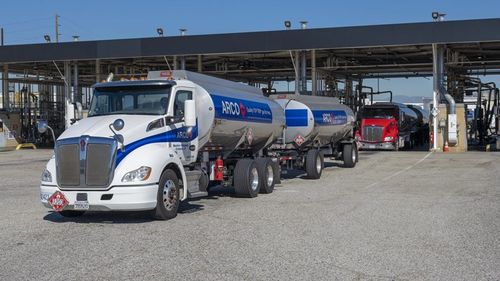Marathon Petroleum trucks and trains transition to using renewable diesel in La Basin

Trucks refueling at the East Hynes terminal in Long Beach, California. / SOURCE: Marathon Petroleum Cop.
March 7, 2024
BY Marathon Petroleum Corp.
Marathon Petroleum's Vinvale and East Hynes fleets in California's Los Angeles Basin have made a significant step toward reducing their carbon footprint and contributing to a cleaner future by transitioning both fleets entirely to renewable diesel. In 2023, two Marathon Petroleum Transport and Rail (T&R) fleets and two locomotives at the Marathon Petroleum Los Angeles refinery, which are supported by T&R, switched from using traditional diesel fuel to renewable diesel.
How we did it
Advertisement
In 2021, Marathon Petroleum began transitioning its ARCO retail sites to renewable diesel. The terminals started replacing CARB diesel - a specific grade of diesel fuel required by the California Air Resources Board (CARB), with renewable diesel. The Marathon Petroleum fleets refuel their trucks at our load racks and have access to renewable diesel because we are supplying it to our customers. Now, 35 trucks are operating on renewable diesel in the Los Angeles area. In 2023, the rail team began fueling the locomotives at a 50-50 mixture with regular diesel and renewable diesel before completely transitioning to 100% renewable diesel.
"At first, drivers asked lots of questions about renewable diesel and if it would have some of the negative effects on the operations of the trucks like biodiesel did in the past," said Timothy Sweeney, Transport Maintenance Supervisor. "We assured them that this was different. Since we have switched, the drivers haven't seen any decrease in power, performance or operations."
Advertisement
Why it matters
Renewable diesel is an alternative to traditional diesel fuel. Renewable diesel is made from a variety of renewable feedstocks such as vegetable oil, animal fats and waste cooking oils. It is processed to be chemically the same as traditional diesel and can be used to operate any traditional diesel engine without modifications.
Related Stories
U.S. fuel ethanol capacity fell slightly in April, while biodiesel and renewable diesel capacity held steady, according to data released by the U.S. EIA on June 30. Feedstock consumption was down when compared to the previous month.
XCF Global Inc. on July 8 provided a production update on its flagship New Rise Reno facility, underscoring that the plant has successfully produced SAF, renewable diesel, and renewable naphtha during its initial ramp-up.
The USDA’s Risk Management Agency is implementing multiple changes to the Camelina pilot insurance program for the 2026 and succeeding crop years. The changes will expand coverage options and provide greater flexibility for producers.
EcoCeres Inc. has signed a multi-year agreement to supply British Airways with sustainable aviation fuel (SAF). The fuel will be produced from 100% waste-based biomass feedstock, such as used cooking oil (UCO).
SAF Magazine and the Commercial Aviation Alternative Fuels Initiative announced the preliminary agenda for the North American SAF Conference and Expo, being held Sept. 22-24 at the Minneapolis Convention Center in Minneapolis, Minnesota.
Upcoming Events










